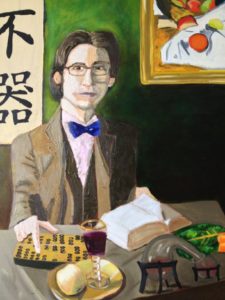Joshua Schrier, Haverford College – Dark Reactions
 Hiding your failures is common, but may not beneficial if you’re a scientist.
Hiding your failures is common, but may not beneficial if you’re a scientist.
Joshua Schrier, associate professor of chemistry and department chair at Haverford College, explores dark reactions and what the failures of an experiment can teach us.
Joshua Schrier is an Associate Professor of Chemistry, and Department Chair at Haverford College, a small private liberal arts college near Philadelphia, USA. He received bachelor’s degrees in chemistry and biochemistry from St. Peter’s College and a PhD in theoretical physical chemistry from the University of California at Berkeley. He was the Alvarez Postdoctoral Fellow in Computational Sciences at Lawrence Berkeley National Laboratory before joining Haverford College in 2008. At Haverford, he has been the recipient of the Dreyfus Teacher-Scholar Award, a Fulbright Scholar, and Cottrell Scholar, among other awards.
His research interests include simulation- and data-driven materials design problems. Past research projects have included simulation-based design of materials for inorganic nanostructures, organic semiconductors, gas separation membranes, and battery materials. One current research effort is as co-PI of “The Dark Reactions Project” an effort to build archive failed inorganic synthesis reaction data and build machine learning models that facilitate the synthesis of novel organic-inorganic hybrid materials, such as amine-templated metal oxides and organohalide hybrid perovskites. Another current research effort is the use of high-throughput automated syntheses combined with machine learning tools to discover new solid state materials. His teaching interests pertain to educating undergraduate chemistry students in computational and data- methods. He is also the author of Introduction to Computational Physical Chemistry (2017).
– Part two of the series from Haverford College, “Fragments of the Dead—or Nearly Dead—Research on the Past to Better Understand the Present and Future-
Dark Reactions
Failure is an embarrassing fact of life. Although we might write about it in a private diary, we tend to only promote our latest success, and not share the details of our failures with the world.
Chemistry research is like life. Most chemical reactions “fail”—that is, they don’t give the desired result. Although chemists carefully record these experiments in laboratory notebooks, scientific journals only publish accounts of the best “successes.” The unrepo

rted failures and marginal successes—what we call “dark reactions”— languish on dusty bookshelves, hidden from public view.
Why are the dark reactions valuable? Well, if you train a machine-learning model to predict whether a reaction “fails” or “succeeds”, but only include published literature data, it will erroneously conclude that every reaction is successful! By including the dark reactions, the model learns the true boundary between failure and success.
To solve this problem, we’ve built a public database to collect dark reactions. Last year we showed that four thousand dark reactions (from a decade of experiments) is enough to train a machine-learning model that can predict the outcome of novel reactions better than human experts. Moreover, our model discovered three new hypotheses about the underlying rules of why these reactions work.
Moving forward, we’re exploring new ways for humans and machines to collaborate in scientific discovery. We call it “self-driving chemistry”. Humans specify high-level goals, such as the ability to absorb light for a solar cell. Machine-learning algorithms select the most informative experiments to achieve those goals, but allow the human expert to veto the plan. Once they agree, robots carry out the reactions. The results get used to improve the machine-learning model, which in turn tells the human what was learned. This offers as faster and cheaper way to discover new materials than the traditional trial-and-error approach.
Read More:
Nature – Machine-learning-assisted materials discovery using failed experiments
Nature – Computer gleans chemical insight from lab notebook failures


